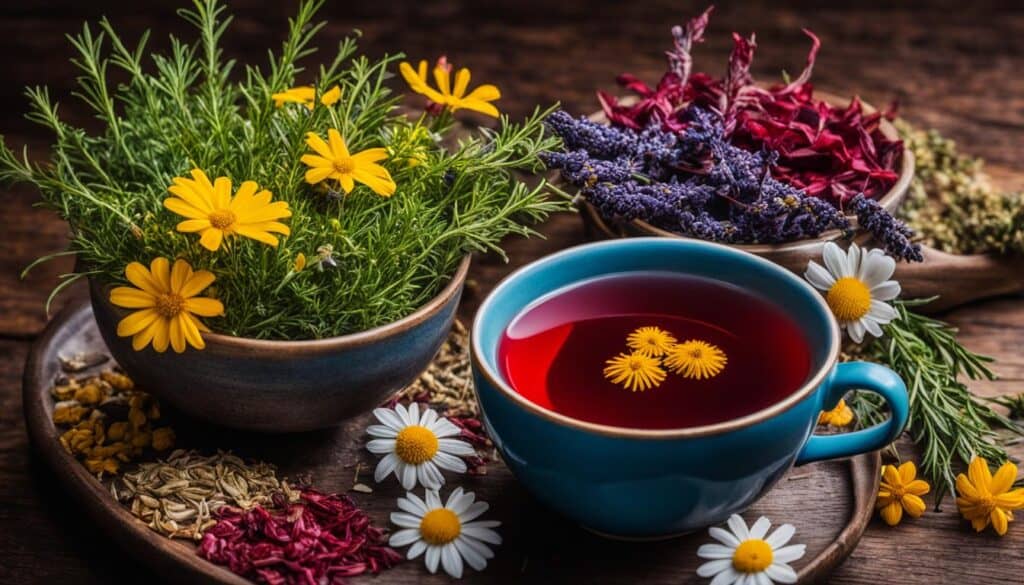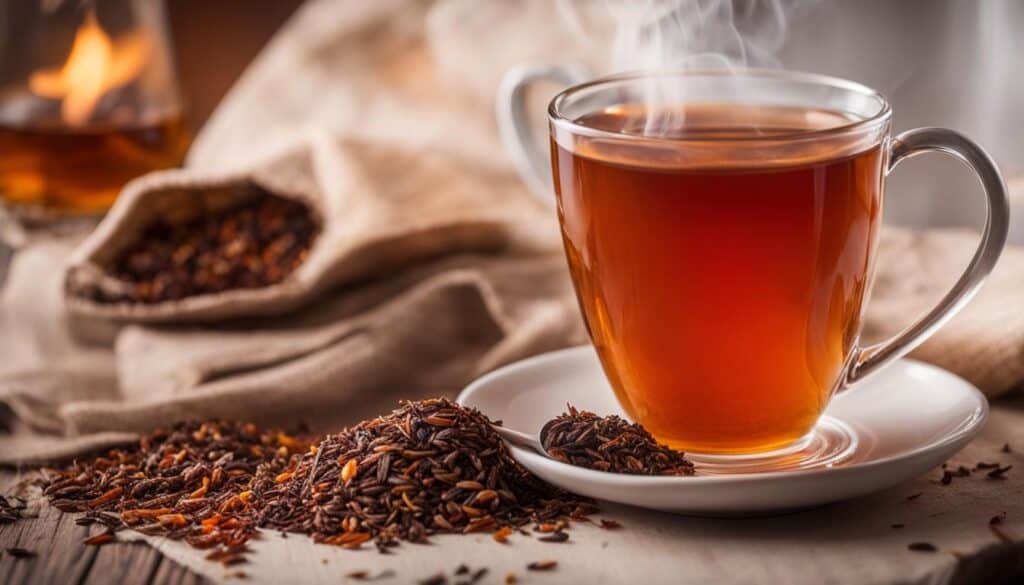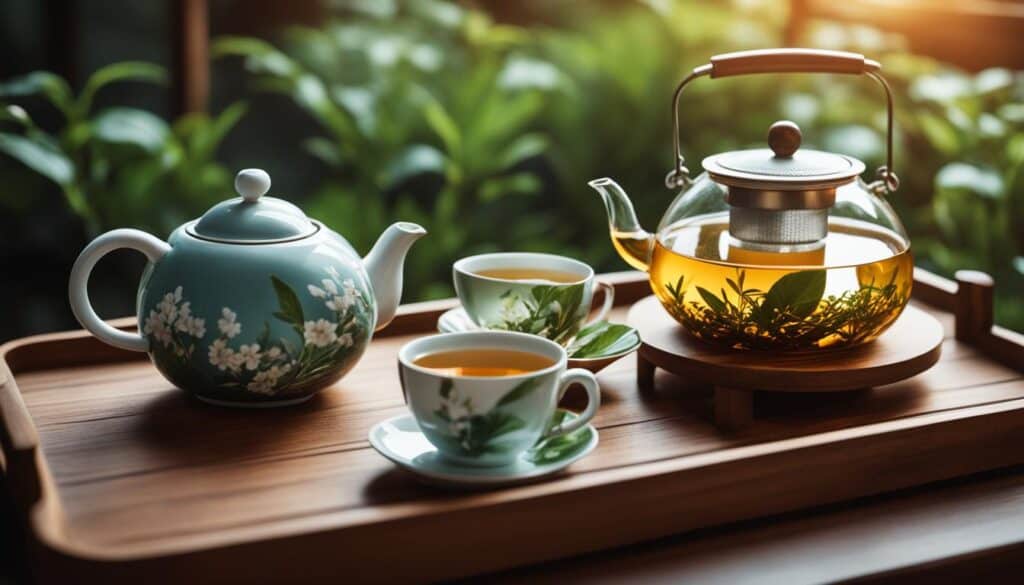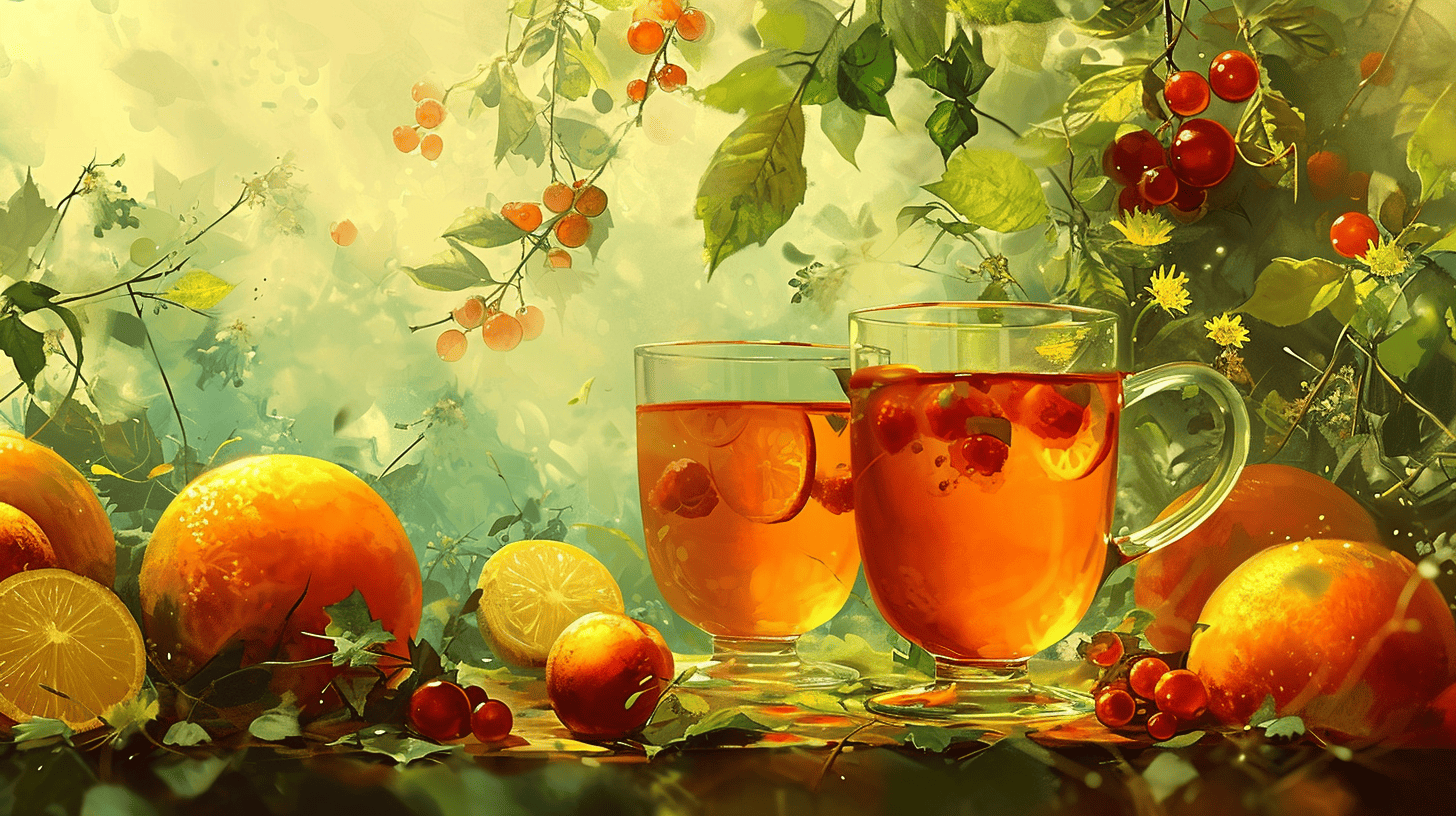Greetings, tea enthusiasts! Today, I want to explore a popular question that often arises when it comes to fruit tea: Does it contain caffeine?
Fruit teas, known for their refreshing taste and health benefits, are loved by many. But what about their caffeine content? Are they a safe choice for those looking to avoid caffeine? Let’s dive into the topic and uncover the truth.
Key Takeaways:
- Fruit tea may or may not contain caffeine, depending on the type of tea used as a base.
- The caffeine content in fruit tea can vary, ranging from 14 mg to 60 mg per cup.
- Factors such as the variety of tea, processing methods, and brewing techniques can impact the caffeine levels in fruit tea.
- Herbal fruit teas, such as chamomile or peppermint, are naturally caffeine-free alternatives.
- It’s important to be mindful of caffeine sensitivity and individual health conditions when enjoying fruit tea or any caffeinated beverage.
What is Caffeine and What Does it Do?
Caffeine is a widely used stimulant that enhances nerve and brain activity, promoting increased energy and focus. It is tasteless and found naturally in plants, including tea leaves. When consumed, caffeine is easily absorbed by the body and can have immediate effects within 5 to 30 minutes. The duration of these effects varies from person to person and can last up to 12 hours. While caffeine can provide short-term benefits, excessive consumption can lead to anxiety and insomnia.
The effects of caffeine in the body can be both positive and negative. Caffeine stimulates the central nervous system, reducing fatigue and increasing alertness. It can improve mood, reaction time, and cognitive function. Additionally, caffeine can enhance physical performance by increasing adrenaline levels and mobilizing fatty acids, which can be used as a source of energy.
However, it’s important to note that caffeine affects individuals differently. Some people may be more sensitive to its effects and experience jitters, anxiety, and difficulty sleeping even with moderate consumption. It’s crucial to find the right balance and be mindful of personal caffeine tolerance.
Table: Caffeine Content in Common Beverages
| Beverage | Caffeine Content (per 8-ounce serving) |
|---|---|
| Black Tea | 14-70 mg |
| Green Tea | 24-45 mg |
| Coffee | 95-165 mg |
| Soda | 20-55 mg |
As seen in the table above, different beverages contain varying amounts of caffeine. While coffee generally has the highest caffeine content, tea can also contribute to daily caffeine intake. It’s important to be aware of the caffeine levels in the beverages consumed and consider personal tolerance and moderation.
Caffeine is absorbed by the body through the gastrointestinal tract and reaches its peak concentration in the bloodstream within 30-60 minutes after consumption. It is then metabolized in the liver and excreted through urine.
Does Passion Fruit Tea Have Caffeine?
Passion fruit tea is a delightful herbal infusion that combines the flavors of passion fruit and tea leaves. While passion fruit itself is naturally caffeine-free, the inclusion of tea as a base introduces caffeine into passion fruit tea.
The caffeine content in passion fruit tea varies depending on the type of tea used. Here are the different types of tea commonly found in passion fruit tea and their associated caffeine levels:
| Tea Type | Caffeine Content (per cup) |
|---|---|
| Black Tea | 14-60 mg |
| Green Tea | 14-60 mg |
| Oolong Tea | 14-60 mg |
| White Tea | 14-60 mg |
As shown in the table, passion fruit tea can contain anywhere from 14 mg to 60 mg of caffeine per cup, depending on the type of tea used. This range allows for flexibility in choosing a caffeine level that suits different preferences or caffeine sensitivities.
The Caffeine Range in Passion Fruit Tea
“The caffeine content in passion fruit tea can vary, ranging from 14 mg to 60 mg per cup.”
It’s important to note that the caffeine content in passion fruit tea is not solely determined by the type of tea used. Other factors, such as the quality of tea leaves, brewing time, and water temperature, can also influence the caffeine extraction process.
It’s fascinating to see how different tea types contribute to the caffeine content in passion fruit tea. Whether you prefer the robustness of black tea or the delicate flavor of white tea, there’s a passion fruit tea variation to suit every taste.
Now that you know the caffeine content in passion fruit tea, you can choose the perfect cup to enjoy the delightful flavors of passion fruit with the added energy of caffeine.
Factors Affecting Caffeine Content in Passion Fruit Tea
The caffeine content in passion fruit tea can vary depending on several factors. These factors include the variety of tea used, the processing methods of the tea leaves, and the brewing techniques employed. Each of these elements can influence the caffeine levels in the final product.
As mentioned earlier, different types of tea have different caffeine levels. For example, black tea generally contains more caffeine than green tea or white tea. Therefore, the choice of tea as a base for passion fruit tea can significantly affect its caffeine content.
The processing of tea leaves can also impact the caffeine levels. Generally, younger tea leaves contain more caffeine compared to older leaves. This is important to consider when selecting the tea for passion fruit tea infusion.
The brewing techniques used can further affect the caffeine content. Steeping times and water temperatures play a crucial role in extracting caffeine from the tea leaves. Longer steeping times and hotter water temperatures tend to extract more caffeine, resulting in a higher caffeine content in the brewed tea.
| Factors Affecting Caffeine Content in Passion Fruit Tea | Effect |
|---|---|
| Tea Variety | Different types of tea have varying caffeine levels. |
| Tea Leaf Processing | Youthful tea leaves generally contain more caffeine. |
| Brewing Methods | Longer steeping times and hotter water temperatures extract more caffeine. |
By considering these factors, tea lovers can better understand and control the caffeine content in their passion fruit tea based on their preferences and needs.
Caffeine in Passion Fruit Tea: Should You Be Concerned?
When it comes to caffeine, it’s essential to understand the recommended intake and consider individual factors such as caffeine sensitivity and health conditions. Passion fruit tea, like other tea blends, contains caffeine, but it should not be a cause for concern if consumed within recommended limits.
For most adults, the safe daily dose of caffeine is around 400 mg. It’s best to space out the consumption throughout the day to avoid potential negative effects. If you enjoy passion fruit tea, there’s no need to worry as long as you moderate your intake and stay within these limits.
“I always thought that caffeine was a major concern in passion fruit tea, but it turns out it’s all about moderation,” says Dr. Sarah Miller, a renowned nutritionist. “As long as you’re mindful of your caffeine intake and stay within the recommended amounts, you can enjoy a cup or two of passion fruit tea without any worries.”
However, if you’re pregnant, it’s important to be cautious about your caffeine consumption. In this delicate period, medical experts advise limiting caffeine intake to 200 mg per day or avoiding it altogether. High caffeine intake during pregnancy may be linked to risks such as miscarriage, premature birth, and low birth weight.
“Pregnant women should be careful not to exceed the recommended caffeine intake,” advises Dr. Elizabeth Thompson, an obstetrician. “It’s always best to consult with your healthcare provider if you have any concerns or questions about caffeine consumption during pregnancy.”
It’s also worth noting that individuals who are sensitive to caffeine may experience adverse effects even with smaller amounts. These effects can include increased heart rate, jitteriness, irritability, and difficulty sleeping. If you know you have caffeine sensitivity, it’s wise to monitor your consumption and adjust accordingly.
Table: Recommended Caffeine Intake
| Category | Recommended Daily Caffeine Intake |
|---|---|
| Adults | Around 400 mg |
| Pregnant Women | Up to 200 mg |
Understanding your own body’s response to caffeine and considering your unique circumstances is crucial when consuming passion fruit tea or any caffeinated beverage. By staying within the recommended limits and being mindful of individual health conditions, you can savor the delicious flavors of passion fruit tea while keeping caffeine in check.
Caffeine Content in Different Types of Tea
When it comes to caffeine content, different types of tea offer varying levels. Let’s take a closer look at the caffeine content in popular tea varieties:
| Tea Type | Caffeine Content per 8-ounce serving |
|---|---|
| Black Tea | 30-60 mg |
| Green Tea | 25-35 mg |
| White Tea | 15-30 mg |
| Oolong Tea | 37-55 mg |
As you can see, black tea generally contains a higher caffeine content compared to other varieties. Green tea, known for its milder taste, typically has a slightly lower caffeine content. White tea, harvested from young leaves, tends to have a relatively lower caffeine content. Oolong tea falls within the middle range of caffeine content.
It’s important to note that these caffeine values are approximate and can vary depending on brewing methods and individual preferences.
Understanding Caffeine in Tea
Caffeine is a natural component found in tea leaves and contributes to its characteristic stimulating effects. However, the caffeine content in tea is generally lower compared to other caffeinated beverages like coffee. The combination of caffeine and other compounds, such as L-Theanine, found in tea creates a unique balance that offers a more gradual and mellow energy boost.
“Tea is not just a drink; it’s an experience that combines the calming effects of L-Theanine with the gentle energy of caffeine.” – [Author Name]
By understanding the caffeine levels in different types of tea, you can make informed choices that align with your caffeine sensitivity and preferences. Whether you prefer the bold flavor of black tea, the delicate taste of green tea, the subtlety of white tea, or the richness of oolong tea, there’s a tea variety to suit every palate and caffeine requirement.
Herbal Tea: Caffeine-free Alternatives to Fruit Tea
When it comes to enjoying a cup of tea without the stimulating effects of caffeine, herbal teas are the perfect choice. Made from a variety of plants, fruits, herbs, and spices, herbal teas are naturally caffeine-free. Unlike traditional tea, such as black or green tea, which comes from the Camellia sinensis plant and contains caffeine, herbal teas offer a delightful and caffeine-free alternative to fruit tea.
Herbal tea blends come in a wide range of flavors to suit every taste preference. Whether you enjoy the soothing effects of chamomile, the refreshing taste of peppermint, the delicate aroma of lavender, or the spicy kick of ginger, there is a herbal tea flavor for everyone to enjoy. These blends are not only caffeine-free but also known for their unique flavors and calming properties.
“Herbal teas offer a delightful and caffeine-free alternative to fruit tea, with a wide range of flavors to suit every taste preference.”
One of the great things about herbal teas is that they can be mixed and combined to create delicious and flavorful blends. From fruity blends with hibiscus and berries to floral combinations with rose petals and jasmine, the possibilities are endless. You can even experiment with adding your favorite herbs and spices to create a personalized herbal tea blend that perfectly suits your taste buds.
So, if you love the taste of fruit tea but prefer to avoid caffeine, consider trying out the wonderful world of caffeine-free herbal teas. With their wide variety of flavors and calming properties, herbal teas are a delightful way to enhance your tea-drinking experience without the jolt of caffeine.

Popular Herbal Tea Blends and Flavors
| Herbal Tea Blend | Flavors |
|---|---|
| Chamomile | Floral, apple-like |
| Peppermint | Cooling, refreshing |
| Lavender | Delicate, floral |
| Ginger | Spicy, warming |
Rooibos Tea: A Caffeine-Free Option with a Rich Flavor
When it comes to caffeine-free alternatives with a delightful taste, rooibos tea is a popular choice. Originating from South Africa, this herbal tea is made from the leaves of the Aspalathus linearis plant, giving it a unique red color and a rich, earthy flavor.
Rooibos tea is a perfect choice for those who enjoy the experience of sipping a warm beverage without the stimulating effects of caffeine. Unlike black or green tea, rooibos tea is naturally free from caffeine, making it a suitable option for individuals who are sensitive to caffeine or prefer to limit their intake.
One of the distinctive features of rooibos tea is its flavor profile. Its earthy and slightly sweet taste is often compared to that of black tea, but with its distinct characteristics. Whether enjoyed hot or cold, rooibos tea provides a comforting and flavorful experience that can be enhanced with a touch of honey or a squeeze of lemon.
“Rooibos tea is a caffeine-free indulgence that allows you to savor the rich taste of tea without any jitters or sleep disturbances.”
The process of harvesting and processing rooibos leaves is quite fascinating. After being carefully picked, the leaves are finely chopped and then undergo a fermentation process. This fermentation process is responsible for the tea’s unique flavor and rich color. Once fermented, the leaves are dried in the sun, and then they are ready to be brewed into a flavorful cup of rooibos tea.

Whether you’re looking for a caffeine-free alternative or simply seeking a delicious tea to enjoy, rooibos tea offers a delightful and satisfying option with its unique flavor and aroma. So why not unwind and indulge in a cup of rooibos tea today?
Caffeine in Tea vs. Coffee: How Do They Compare?
While both tea and coffee contain caffeine, there are differences in their caffeine content and effects. On average, a cup of coffee contains around 95 mg of caffeine, whereas tea typically has around 47 mg.
The stimulating effects of coffee may be more immediate and intense, while tea, with its L-theanine content, provides a more gradual and mellow energy boost. The presence of catechins in tea also influences brain function and can affect how tea makes you feel compared to coffee.
To better understand the differences between caffeine in tea and coffee, let’s take a closer look:
Caffeine Content Comparison
| Drink | Approximate Caffeine Content per Cup |
|---|---|
| Coffee | 95 mg |
| Black Tea | 47 mg |
| Green Tea | 28 mg |
Note: The exact caffeine content can vary depending on factors such as the brewing method and the specific type of coffee or tea used.
Effects on the Body
Coffee is known for its invigorating and energizing effects, often providing a quick burst of energy. In contrast, tea with its combined caffeine and L-theanine content can offer a more balanced and sustained energy boost. L-theanine is an amino acid that promotes relaxation and counteracts the potential jitters caused by caffeine.
The presence of catechins in tea, particularly green tea, offers additional benefits to the body. Catechins have antioxidant properties and may support cardiovascular health, boost metabolism, and promote weight loss.
Remember, caffeine affects each person differently. It’s essential to listen to your body’s response and find the right balance that works for you.
Ultimately, choosing between tea and coffee comes down to personal preference and individual sensitivities. Some may prefer the strong kick of coffee, while others may opt for the milder and soothing effects of tea. Whatever your choice, it’s important to enjoy your beverage in moderation and be mindful of its caffeine content.
Understanding the Role of L-Theanine in Tea
When it comes to the unique qualities of tea, one cannot overlook the contribution of L-Theanine. This natural component found in tea leaves plays a crucial role in balancing the effects of caffeine and enhancing the overall tea-drinking experience.
L-Theanine possesses calming properties that promote relaxation and a sense of tranquility, making it an ideal companion to the stimulating effects of caffeine. Unlike the jitters often associated with coffee consumption, L-Theanine in tea provides a gentle energy boost without the accompanying restlessness.
The interplay between L-Theanine and caffeine creates a one-of-a-kind “buzz” that sets tea apart from other beverages. This harmonious combination not only uplifts the drinker but also promotes mental focus and alertness.
“The combination of L-Theanine and caffeine in tea provides a unique balance of energy and calmness. It’s like experiencing a gentle lift without the crash associated with other caffeinated drinks.” – Tea enthusiast
Furthermore, L-Theanine influences brain function, enhancing cognitive performance and increasing attention and concentration levels. The presence of this natural compound in tea contributes to its reputation as a drink that promotes mental clarity and relaxation.
Overall, L-Theanine plays a vital role in tea, allowing for a harmonious balance between energy and tranquility. Whether you prefer the soothing green tea or the robust black tea, L-Theanine is responsible for heightening the unique experience that only tea can provide.
To give you a visual representation of the effects of L-Theanine, refer to the table below:
| L-Theanine | Caffeine | Result | |
|---|---|---|---|
| Tea | High | Moderate | A gentle energy boost with a calm, focused mind |
| Coffee | Low | High | An intense energy spike with possible restlessness and jitters |
As you can see, the presence of L-Theanine contributes to the distinct characteristics of tea, providing a well-rounded and enjoyable beverage that promotes both physical and mental well-being.

Busting the Myths About Tea and Caffeine
Tea and caffeine are often subject to many myths and misconceptions. Let’s delve into some of the common misconceptions surrounding tea and caffeine.
Myth: Black Tea Always Has More Caffeine Than Green Tea
This is a widespread misconception. While it is generally true that black tea has higher caffeine levels than green tea, the actual caffeine content can vary significantly within both black and green teas. The caffeine content in tea is influenced by various factors, including the type of tea, processing methods, and brewing techniques.
Myth: Herbal Tea Contains Caffeine
This is not true. Herbal teas, also known as tisanes, are made from various plants, fruits, herbs, and spices, but they do not contain any tea leaves from the Camellia sinensis plant. Therefore, herbal teas are naturally caffeine-free and offer an excellent option for those looking to avoid caffeine without compromising on flavor.
Myth: All Teas Are Caffeinated
While it is true that teas made from the Camellia sinensis plant (such as black, green, oolong, and white tea) contain caffeine, there are various caffeine-free options available. Herbal teas, rooibos tea, and other caffeine-free infusions provide flavorful alternatives for tea enthusiasts who prefer to avoid caffeine.
By clarifying these myths, we can better understand the caffeine content in different types of tea and make informed choices based on our preferences and dietary needs.
| Tea Type | Average Caffeine Content |
|---|---|
| Black Tea | 30-60 mg per 8-ounce serving |
| Green Tea | 25-35 mg per 8-ounce serving |
| Oolong Tea | 37-55 mg per 8-ounce serving |
| White Tea | 15-30 mg per 8-ounce serving |
| Herbal Tea (Tisanes) | Caffeine-free |
It’s important to note that these values are approximate and may vary depending on factors such as brewing time, water temperature, and individual preferences.
Now that we have debunked these myths, tea enthusiasts can enjoy their favorite blends without worrying about the caffeine content. Whether you prefer a soothing herbal infusion or a robust black tea, rest assured that there are options to suit your taste and caffeine preferences.
Conclusion
In conclusion, it is important to understand the caffeine content in fruit tea and make informed choices based on individual preferences and health needs. Passion fruit tea, when made with tea leaves as a base, does contain caffeine. The actual caffeine content can vary depending on factors such as the type of tea used and the brewing methods employed.
However, consuming passion fruit tea within recommended amounts is generally not a cause for concern. It is important to be mindful of personal caffeine sensitivity and to adhere to the recommended daily caffeine intake limit. For those looking to avoid caffeine altogether, herbal teas and rooibos tea provide excellent caffeine-free alternatives.
By understanding the caffeine content in different types of tea, individuals can choose the options that best suit their needs. Whether seeking a gentle energy boost or a calming and soothing experience, there is a tea variety available for everyone. So go ahead and savor the flavors of fruit tea while being mindful of the caffeine content to enjoy a delightful and refreshing beverage.
FAQ
Does fruit tea have caffeine?
Yes, fruit tea can have caffeine depending on the type of tea used as a base.
Is there caffeine in fruit tea?
Yes, the caffeine content in fruit tea can vary depending on the type of tea used as a base.
How much caffeine is in fruit tea?
The caffeine levels in fruit tea can range from 14 mg to 60 mg per cup, depending on the type of tea used as a base and other factors.
Does herbal fruit tea have caffeine?
No, herbal fruit tea is naturally caffeine-free as it is made from a variety of plants, fruits, herbs, and spices.
What are the benefits of fruit tea?
Fruit tea is known for its refreshing taste and health benefits, including antioxidant properties and potential immune-boosting effects.
Can fruit tea be consumed by individuals with caffeine sensitivity?
Individuals with caffeine sensitivity should be cautious when consuming fruit tea with caffeine and consider caffeine-free alternatives.
What are the different types of fruit tea?
Fruit tea can be made with various types of tea as a base, such as black tea, green tea, oolong tea, or white tea.
How much caffeine is in fruited tea?
The caffeine content in fruited tea can vary depending on the type of tea used as a base and other factors.





Leave a Reply